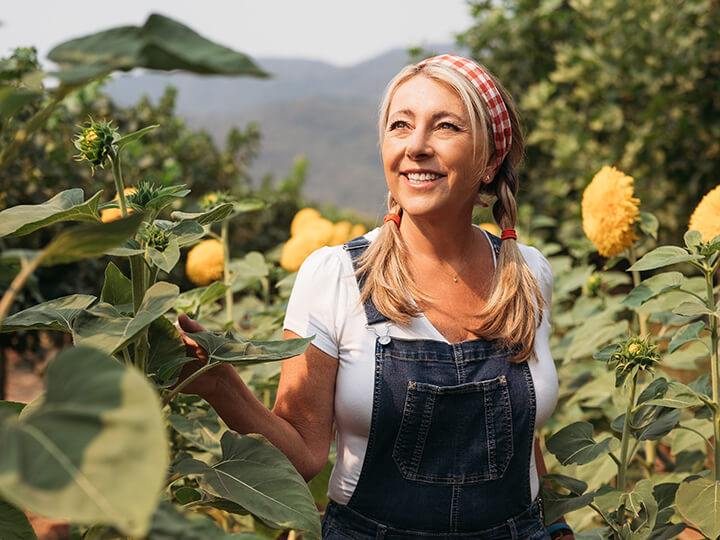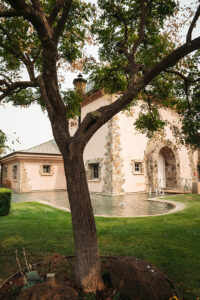
PEJU WINERY’S SARA FOWLER VIEWS WINEMAKING AS AN EXTENSION OF FAMILY VALUES
story by Randy Caparoso / photos by Clara Rice
This fall, PEJU Winery winemaker and vice president of operations Sara Fowler celebrated her 16th harvest at the Rutherford estate, which is very much a family-run operation: That is to say, people named Peju are everywhere, leaving their fingerprints on all facets of their business in the historic heart of Napa Valley. When you drive onto the 30-acre estate, founded in 1983 by Tony and Herta “H.B.” Peju, the sign on the stone wall at the front entrance proudly proclaims that you’re entering “Peju Province”—an indication that the property is cut from a slightly different cloth than the rest of this storied appellation.

The couple’s daughters, Lisa and Ariana, were just 6 and 3 years old, respectively, when their family moved to Napa Valley from Los Angeles, where Tony ran several plant nurseries. Wine-country life became so thoroughly infused into the sisters’ veins that they chose to remain there as adults to serve as co-owners and hands-on managers. The family’s operations have since expanded to comprise six estate vineyards totaling 232 planted acres across five properties in Oak Knoll, Carneros, Calistoga, and Pope Valley. The original PEJU estate vineyard in Rutherford is certified organic by the California Certified Organic Farmers (CCOF), while the other five are sustainably farmed as they undergo the transition to certified-organic status.
The Pejus initially sold the Cabernet Sauvignon grapes grown on the Rutherford estate to other wineries, but after they debuted the first vintage of PEJU Cabernet Sauvignon in 1985, it quickly became apparent that future success hinged upon production of their own wines. In the mid-1990s, the family completed construction on a winery and tasting room; by that point, the PEJU H.B. Vineyard Cabernet Sauvignon had garnered accolades such as an appearance on Wine Spectator’s Top 100 list.
Fowler’s first order of business upon coming aboard in 2006 was to convert the estate to organic farming; from that point onward, she says, “I have never felt like I was employed by a company—I felt like I became part of a family. A lot of it was because H.B. had as strong a role in the winery’s direction as Tony, and Lisa and Ariana were always there and deeply involved.”
Their leadership has solidified PEJU as a “strong women-run company” today, she adds, and while “it wasn’t that way in the beginning, it is now predominantly women who run production, marketing, human resources, [and] the finance teams. This supportive, empathetic, female-led environment is reflected in the property grounds and the way we run our hospitality, and it also extends into our wines.”
Fowler endeavors to ensure that the wines of PEJU reflect the character of the family’s various estate vineyards. “You can’t overemphasize the importance of growing your own fruit because that makes you conscious, as a winemaker, of retaining a sense of place—not messing with what you get out of the vineyards,” she says. “PEJU wines are also made with a European mindset in that they are meant to go with food. I don’t want anything to be overdone, over-extracted, or heavy—we go for brightness and freshness with balanced acidity.”
In that vein, Fowler explains, “Oak is an example of something that is added only as needed. It’s like using salt in the kitchen—why overdo it? Like a good chef who understands spices and ingredients, you can achieve a lot once you get to know your vineyards, even in wines aged in 100% new barrels.”

One PEJU label, The Experiment, enables Fowler and her team to work with a wide variety of barrels from various cooperages and compare the results to achieve the winery’s trademark character. “Each year we order anywhere from 30 to 60 different types of barrels [from 25 to 60 different cooperages], and we’ll age Cabernet Sauvignon from our Persephone Vineyard in two each of those new barrels,” she says. “The barrels reflect . . . different forests, [different] thicknesses of staves, [and] different toast levels reflecting different temperatures and lengths of toasting—some with barrel heads that are toasted and some with heads that are not [as well as] steamed barrels versus fire-bent barrels, American versus French, and so forth. Learning what we have in terms of barrels is like learning what we have in the way of fruit from all the different blocks in our vineyards.”
In short, she adds, The Experiment “gives us the opportunity to match our oak with fruit in order to produce the types of wines that, say, a sommelier might prefer, which are well-integrated wines that do not scream ‘oaky’ and, of course, pair well with food.”

Tasting Notes
PEJU 2020 Legacy Collection Sauvignon Blanc, Napa Valley ($28) This expression is crafted with fruit from the estate’s Persephone and Tess vineyards in Pope Valley—which could more accurately be described as being on the back side of Howell Mountain, since they sit on slopes over 1,000 feet in elevation. It’s fermented in stainless steel, with some lees stirring in the tank to enhance the texture of its keenly crisp, tense, lemony medium body, but it lacks any leesiness on the nose; instead, floral, citrus, and honeydew scents carry through a fresh, snappy finish.
PEJU 2020 Reserve Cabernet Franc, Napa Valley ($150) Although Cabernet Sauvignon makes up 20% of the blend, it lends none of the tannin or weightiness one might expect; instead, this is a svelte, velvety, long, and even-keeled wine that studiously avoids the green characteristics associated with the primary varietal. Aging in French oak (85% new) highlights the pungency of cedar, mint, and raspberry on the nose and adds to a layered, round, and savory feel. A good example of Fowler’s ability to employ oak without falling into its sensory trappings.
PEJU 2018 Cabernet Sauvignon, Napa Valley ($65) Crafted from PEJU’s Pope Valley, Oak Knoll, Calistoga, and Rutherford estate sites, this wine aged 19 months in French and American barrels (40% new). The addition of 4% Merlot and a half percent each of Petit Verdot and Cabernet Franc adds up to an appealingly plump and sumptuously layered and textured wine, generous in its focus on black currant and black cherry and tinged with herbaceous/cigar-box qualities. Staying true to both its varietal and its place of origin, this Cabernet Sauvignon is exactly what it’s supposed to be.
PEJU 2019 Legacy Collection Cabernet Sauvignon, Napa Valley ($65) With the same barrel regimen and SRP as the PEJU 2018 Cabernet Sauvignon, the 2019 Legacy Collection is a more classic Bordeaux blend (75% Cabernet Sauvignon, 17% Merlot, 6% Petit Verdot, and 2% Malbec) that shows signature finesse. The deep and pungent nose expresses cassis without a sense of excess extraction or oakiness, and the mastery of the blending is manifested in the moderately weighted, polished, round, and seamless core of concentrated fruit, which is tinged with subtle, smoky spice.
PEJU 2018 Barrel Exp 100% Cabernet Sauvignon, Napa Valley ($110) This iteration of The Experiment is every bit as exquisite as the label’s previously acclaimed vintages; in 2018, it involved 40 different barrels crafted by 25 coopers. Mint leaf and espresso bean bring the varietal character of the wine into sharp focus unburdened by clumsy sensations of oak. The medium-full body, while restrained, is filled to the brim with rich, zesty smoke- and spice-toned qualities beefed up by sturdy yet finely polished tannins. Simply put, this wine wows.
